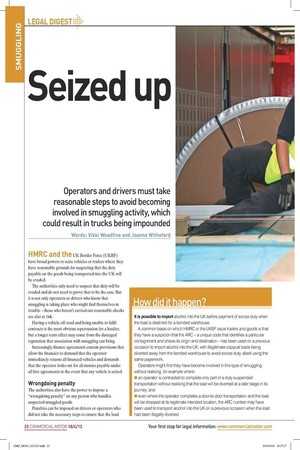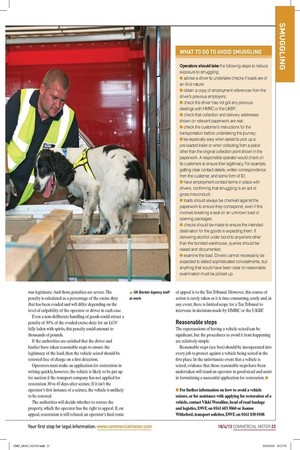Seized up Operators and drivers must take reasonable steps to
Page 16

Page 17

If you've noticed an error in this article please click here to report it so we can fix it.
avoid becoming involved in smuggling activity, which could result in trucks being impounded Words: Vikki Woodfini_ and Joanne Witheford HMRC and theuK Border Force (UKBF) have broad powers to seize vehicles or trailers where they have reasonable grounds for suspecting that the duty payable on the goods being transported into the UK will be evaded.
The authorities only need to suspect that duty will be evaded and do not need to prove that to be the case. But it is not only operators or drivers who know that smuggling is taking place who might find themselves in trouble — those who haven't carried out reasonable checks are also at risk.
Having a vehicle off-road and being unable to fulfil contracts is the most obvious repercussion for a haulier, but a longer-term effect may come from the damaged reputation that association with smuggling can bring.
Increasingly, finance agreements contain provisions that allow the financier to demand that the operator immediately returns all financed vehicles and demands that the operator forks out for all monies payable under all hire agreements in the event that any vehicle is seized.
Wrongdoing penalty The authorities also have the power to impose a "wrongdoing penalty" on any person who handles suspected smuggled goods.
Penalties can be imposed on drivers or operators who did not take the necessary steps to ensure that the load was legitimate. And those penalties are severe. The UK Border Agency staff penalty is calculated as a percentage of the excise duty at work that has been evaded and will differ depending on the level of culpability of the operator or driver in each case.
Even a non-deliberate handling of goods could attract a penalty of 30% of the evaded excise duty: for an LGV fully laden with spirits, this penalty could amount to thousands of pounds.
If the authorities are satisfied that the driver and haulier have taken reasonable steps to ensure the legitimacy of the load, then the vehicle seized should be restored free of charge on a first detection.
Operators must make an application for restoration in writing quickly, however, the vehicle is likely to be put up for auction if the transport company has not applied for restoration 30 to 45 days after seizure. If it isn't the operator's first instance of a seizure, the vehicle is unlikely to be restored.
The authorities will decide whether to restore the property, which the operator has the right to appeal. If on appeal, restoration is still refused, an operator's final route of appeal is to the Tax Tribunal. However, this course of action is rarely taken as it is time consuming, costly and, in any event, there is limited scope for a Tax Tribunal to intervene in decisions made by HMRC or the UKBE Reasonable steps The repercussions of having a vehicle seized can be significant, but the procedures to avoid it from happening are relatively simple.
Reasonable steps (see box) should be incorporated into every job to protect against a vehicle being seized in the first place. In the unfortunate event that a vehicle is seized, evidence that those reasonable steps have been undertaken will stand an operator in good stead and assist in formulating a successful application for restoration. • • For further information on how to avoid a vehicle seizure, or for assistance with applying for restoration of a vehicle, contact Vikki Woodfine, head of road haulage and logistics, DWF, on 0161 603 5060 or Joanne VVitheford, transport solicitor, DWF, on 0161 838 0108 It is possible to import alcohol into the UK before payment of excise duty when the load is destined for a bonded warehouse.
A common basis on which HMRC or the UKBF seize trailers and goods is that they have a suspicion that the ARC — a unique code that identifies a particular consignment and shows its origin and destination — has been used on a previous occasion to import alcohol into the UK, with illegitimate copycat loads being diverted away from the bonded warehouse to avoid excise duty, albeit using the same paperwork.
Operators might find they have become involved in this type of smuggling without realising, for example where: • an operator is contracted to complete only part of a duty-suspended transportation without realising that the load will be diverted at a later stage in its journey; and • even where the operator completes a door-to-door transportation and the load will be dropped at its legitimate intended location, the ARC number may have been used to transport alcohol into the UK on a previous occasion when the load had been illegally diverted. WHAT TO DO TO AVOID SMUGGLING Operators should take the following steps to reduce exposure to smuggling: • advise a driver to undertake checks if loads are of an illicit nature; • obtain a copy of employment references from the driver's previous employers; • check the driver has not got any previous dealings with HMRC or the UKBF; • check that collection and delivery addresses shown on relevant paperwork are real; • check the customer's instructions for the transportation before undertaking the journey; • be especially wary when asked to pick up a pre-loaded trailer or when collecting from a place other than the original collection point shown in the paperwork. A responsible operator would check on its customers to ensure their legitimacy. For example, getting clear contact details, written correspondence from the customer, and some form of ID; • have employment contact terms in place with drivers, confirming that smuggling is an act of gross misconduct; • loads should always be checked against the paperwork to ensure they correspond, even if this involves breaking a seal on an unknown load or opening packages; • checks should be made to ensure the intended destination for the goods is expecting them. If delivering alcohol under bond to anywhere other than the bonded warehouse, queries should be raised and documented; • examine the load. Drivers cannot necessarily be expected to detect sophisticated concealments, but anything that would have been clear on reasonable examination must be picked up.







































